Hellraisers Journal: Illustrations & Report from the Anthracite Hills of Pennsylvania by Robert Minor
Put on your fighting clothes.
-Mother Jones
Wednesday April 12, 1916
From the International Socialist Review: Robert Minor: "In the Anthracite Hills"
From the Review of April 1916:
In the Anthracite Hills
By ROBERT MINOR
Courtesy of the Newspaper Enterprise Association.
BEFORE starting for the anthracite coal fields to investigate and picture for the Review such conditions as might account for a threatened strike of tremendous size, I cast about New York City for a "tip."
"WHY, THEY HAVE PIANOS IN THEIR HOUSES!" exclaimed one wealthy coal stockholder. They imagine that big war profits are accruing and they greedily snatch for a part. They are making a good living and more; now they want money to blow in on luxuries."
In the outskirts of Scranton lies the little mining settlement of Underwood. Winning the confidence of a mine mule driver, I went to visit some miners under his guidance.
The first home I entered was that of a Pole, living in a company house.
"Have you a piano?" I asked. He looked at me quizzically.
"This ain't no place to keep a piano," he said, pointing to the front door, where a split up the middle admitted both day light and whistling wind.
It was cold inside. The back door-was a barn door, so crudely hanging in its place as to show a bit of landscape thru the crack.
The house is built of one thickness of lumber with a little plaster inside.
The miner explained that he papered the house and partly floored it himself, the place as turned over to the renter by the company having the bare earth for a portion of its floor.
These company houses—each four rooms and a lean-to—are built in a dismal row, all exactly alike.
Asked where his water supply was, the miner opened the door and pointed down the hill to a pump.
"That is the water supply for eight houses," he said.
Sewage systems are unheard of. The vast majority of the houses would just about do for barns. They are not rented to "laborers," as "laborers" (miners' assistants) are not able to pay the rent.
When the union itself tried to get the Underwood miners to wait, they threw down their tools, left the old union, and called upon Joseph J. Ettor of the I. W. W. to organize them.
So, it isn't a desire for "pianos and such" that causes the trouble in the coal fields.
But, as one Irish miner said to me, "Ain't a miner got a right to a piano?"
It is well worth noting that the I. W. W. is organizing in unorganized towns, often where the workers permitted the old union to expire because of their lack of faith in its ability to accomplish any thing for them. Since August, 1915, the I. W. W. has kept organizers and speakers in the Scranton district. The results were shown in the first I. W. W. convention at Old Forge, on Sunday, Feb. 6. Ten towns and twelve locals and branches were represented by 46 delegates.
The strike thruout this section has been on for over four weeks. The coal barons at Durrea, Dupont and Old Forge have thrown up the sponge, settled with the I. W. W. and the miners are back again on the job. At Greenwood there are several hundred still out. The spirit of solidarity among the Polish and Italian miners is splendid. About one hundred men have gone back into the mines under the protection of deputies, but there were very few miners among these scabs.
In a report of the Greenwood strike, the Scranton Times of Friday, Feb. 25, prints the following:
"There is a very peculiar situation in Greenwood, as shown by the duebills of the striking miners, most of their laborers receiving more money."
A duebill, it may be explained, is a bill to the miner, showing amounts due to him after the company has deducted all the charges against his earnings.
"The laborers won't work for less than two dollars a day, and miners who showed duebills at the meeting yesterday had anywhere from 31 cents to $19.38 coming to them.
Anthony Petrosky, who is number 159 on the company's roll, worked eight days. He was out of the mines several days because of the death of a child at his home. It was the intention of Petrosky to pay something on the funeral account when he received his wages. His due- bill showed him entitled to $2.51 for the eight days. He told his story at the meeting yesterday.
"Ludwig Cling was another to tell his story during the session. There are seven in his family, and he has been mining for some time. His number is 160. His earnings for two weeks amounted to $24.31. The deductions included three kegs of powder, cost of sharpening tools, ton of coal, and $14, which was paid his laborer. His balance was 31 cents.
"Some of the duebills shown at the meeting yesterday follow, most of them being for two week's work:
"Miner No. 157 earned $7.67, and the deductions were $7.75, leaving him in debt 8 cents to the company.
"Miner No. 159 worked eight days and received $2.51, and one ton of coal. Claims to have been cheated out of $17.91. Same miner for a previous two weeks received 8 cents.
"Miner No. 518 worked nine days, got out ten cars of coal and earned $38.51. The deductions were $40.49, and his net earnings were $8.02. His laborer received $14."
Under the company store system, a very close imitation of chattel slavery was shrewdly maintained. A trip thru the anthracite hills brings one into contact with men who, in the old days, worked years for coal companies without once receiving a piece of actual money—always in debt to the company without hope of release or even the power to rebel. They simply were doled out what a black slave received before the civil war—their board and clothes.
The strike of 1900 swept that form of slavery away—ALMOST. It still persists in the Scranton region among the smaller coal companies.
The regulations abolishing the system are now evaded by the simple means of putting those miners who do not trade at the company store to work in places where they cannot get out enough clean coal to make a living. Of course, the miners are "free" to trade where they please.
But why do the miners want more money? Strikes of the past have raised their pay about 26 per cent.
Inquiry brings out that the cost of household supplies in the region have increased in the same time between 40 and 50 per cent. Rents have gone up 40 per cent in Scranton in the past 15 years, according to the miners' figures, and they say the companies charge employes 75 per cent more for their household coal.
It is easy to see where the 26 per cent wage increase goes.
Mine jargon divides the miners into two classes—"pets" and "suckers." The "pets"—who, the miners claim, are chosen for their loyalty to the union—get jobs at "robbing pillars," which means tearing out the solid masses of coal which are left standing till the last to hold up the roof. This enables the favored one to make $75 or $80 in two weeks.
* * *"I want to fight!"
This is the answer I got from a hard coal miner to my question as to living conditions in the anthracite fields of Pennsylvania. This man has been working near Wilkesbarre and living in a company house 18 years. He has four children.
"What do you want to fight about?" I asked.
"For straight pay for every pound of coal I cut, instead of being docked a quarter or a half-car for a few fragments of rock in the coal."
The man who said he wanted to fight was in a saloon, drinking beer. I wondered whether to take him seriously. Then he invited me to his house. After ten minutes in that windy shack, let to him by his employers, I wondered why he didn't spend ALL his time in the saloon! He was a very sober fellow.
The liquor question is made much of in that district. Some of the miners' union organizers told me a crusade against alcohol is strongly backed by mine operators every time there is a threat of labor troubles.
"It's to give the men something to blame instead of the boss," said one. "The operators pick any movement that has a respectable look and back it up, trying to make the miners place their hopes there instead of in the union.
"Right now there is an evangelist going at it hammer and tongs, diverting the men's minds from the impending strike."
"What makes you think it has anything to do with the proposed mine trouble?" I asked.
"Because all the coal operators are footing the bills for the revivals."
The whole of life there seems to center around coal. Even the medical profession is not untouched. The compensation law of Pennsylvania requires the companies to pay the medical expenses of an injured miner to the extent of $25, or for a major surgical operation, $75.
The miner is to receive 50 per cent of his wages for the time he is incapacitated after the first 14 days.
Well, the companies hire the doctors, many of whom, the miners say, are so solicitous of their employers' interests as to declare the injured men capable of working at the end of the first 14 days, so he receives nothing.
But why are not these difficulties attended to by the conciliation board appointed for that purpose? They are—IN THE COURSE OF TIME. That is, a miner complains of injustice of treatment or unfair discharge and waits for a decision several months. When the decision finally comes, even tho it may declare him in the right, the miner generally receives no compensation for time lost.
It seems as tho all the machinery of law and agreement, built to protect the coal miners, either clogs or breaks down. He clings to the last reliance in which he has hope—the union.
[Photograph of Robert Minor added.]
SOURCE
The International Socialist Review, Volume 16
-ed by Algie Martin Simons, Charles H. Kerr
Charles H. Kerr & Company,
July 1915-June 1916
https://books.google.com/books?id=9VJIAAAAYAAJ
ISR, April 1916
https://books.google.com/books/reader?id=9VJIAAAAYAAJ&printsec=frontcove...
"In the Anthracite Hills" by Robert Minor
https://books.google.com/books/reader?id=9VJIAAAAYAAJ&printsec=frontcove...
IMAGES
Robert Minor, Company Shacks, Scranton PA, ISR Apr 1916
https://books.google.com/books/reader?id=9VJIAAAAYAAJ&printsec=frontcove...
Robert Minor
https://en.wikipedia.org/wiki/Robert_Minor
Robert Minor, Company Shacks, Hazelton PA, ISR Apr 1916
https://books.google.com/books/reader?id=9VJIAAAAYAAJ&printsec=frontcove...
Robert Minor, Mining Camp, Hazelton PA, ISR Apr 1916
https://books.google.com/books/reader?id=9VJIAAAAYAAJ&printsec=frontcove...
Robert Minor, Colliery, Luzerne PA, ISR Apr 1916
https://books.google.com/books/reader?id=9VJIAAAAYAAJ&printsec=frontcove...
Robert Minor, Miners at Work, Near Scranton PA, ISR Apr 1916
https://books.google.com/books/reader?id=9VJIAAAAYAAJ&printsec=frontcove...
Robert Minor, Miner Going to Work, ISR Apr 1916
https://books.google.com/books/reader?id=9VJIAAAAYAAJ&printsec=frontcove...
See also:
Robert Minor
http://spartacus-educational.com/ARTminor.htm
United Mine Workers Journal of Apr 6, 1916
on Anthracite Negotiations
https://books.google.com/books/reader?id=NQpQAAAAYAAJ&printsec=frontcove...
https://books.google.com/books/reader?id=NQpQAAAAYAAJ&printsec=frontcove...
Note: I believe that "the disgruntles" (see quote below) refers to the Industrial Workers of the World which had succeeded in organizing miners at the Greenwood and Old Forge mines near Scranton. Under the leadership of the IWW, five hundred miners had declared a strike in February in defiance of the U. M. W. agreement with the coal operators which stated that the miners would continue to work while their contract was being negotiated.
An Old Evil at Work Again.True to form, the disgruntles who continuously roam about over the country and make the most of every opportunity to pour the poison of distrust into the minds of the "unwary," have again journeyed to the anthracite to do their utmost to block progress. In the "non-suspension" policy these emissaries of discord thought they could cover their work. But in this they were sadly mistaken, for President White and his associates have been assured that the anthracite miners have given their whole sale endorsement to this all-wise plan and that they will remain at work until a contract is negotiated or a break occurs.
[Emphasis added]
Evening Public Ledger
(Philadelphia, Pennsylvania)
-Feb 18, 1916
"500 I. W. W. Miners Strike at Scranton"
-Bottom of column 4.
http://chroniclingamerica.loc.gov/lccn/sn83045211/1916-02-18/ed-1/seq-2/
The Daily Telegram
(Clarksburg, West Virginia)
-Apr 25, 1916
"Industrial Workers Are Thrown into Jail
Following a Riot between Their Organization
and the United Mine Workers"
-report from Wilkes Barre, PA
-Bottom of column 4.
http://chroniclingamerica.loc.gov/lccn/sn85059715/1916-04-25/ed-1/seq-13/
C99 Search: Mother Jones + Anthracite
http://caucus99percent.com/search/node/mother%20jones%20anthracite

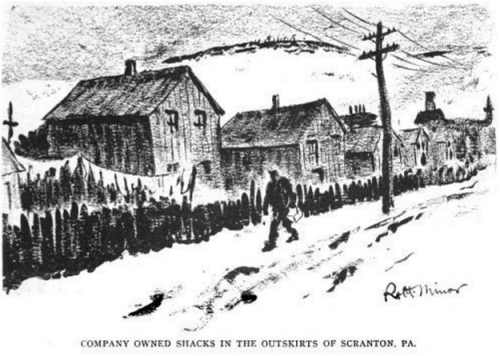

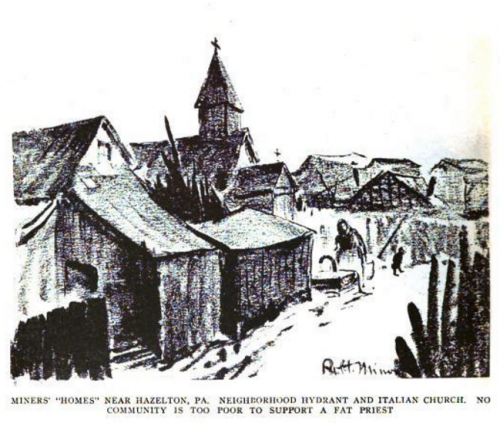
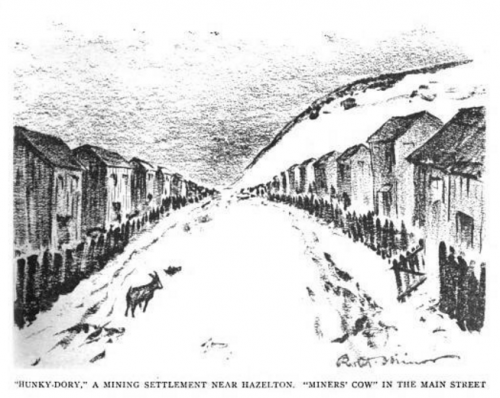
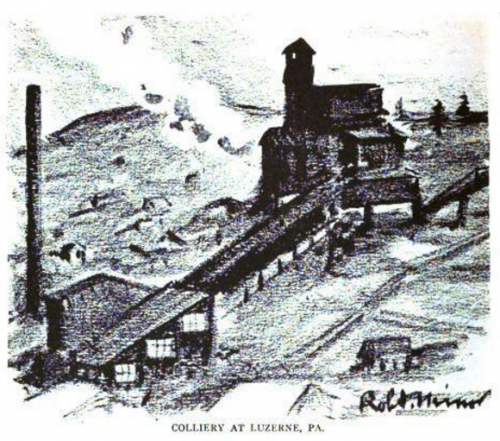
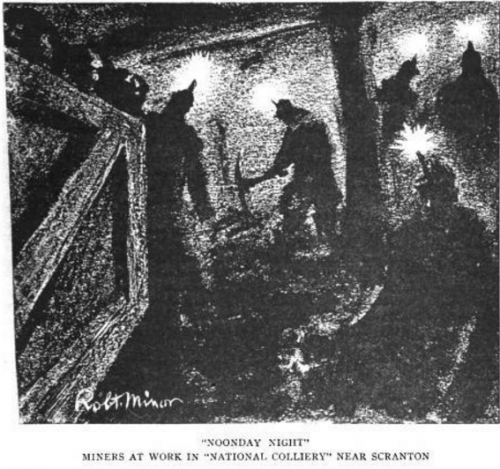
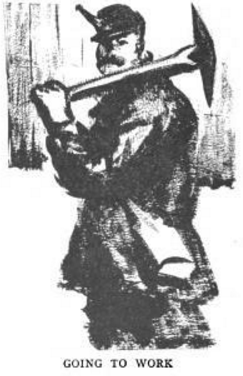

Comments
Phew, what a story, JaeRae. The mine owners in South Africa
pulled most of the same tricks and a few of their own on black migrant workers for decades until the miners unions became strong enough to to win some semblance of a life. But the same corporate shenanigans still go on even in the two and a half democratic decades.
Jeebus Murphy, the corporate crooks never end. Until one day we outlaw the corporation as a legal form of conducting business. When G is king of the world, a business person could use the partnership or the co-op forms of legal business entity and that's it.
Why banning the corporation isn't the second thing on the progressive agenda after climate resilience is beyond me. Why the f*ck do we tolerate the corporation when we know beyond dispute that it is a sociopathic legal entity?
Resilience: practical action to improve things we can control.
3D+: developing language for postmodern spirituality.
Thank you, Gerrit, for calling out the Corporations as the
soulless bastards that they are.
The crimes against humanity committed by the corporations should be researched all the way to beginning of chattel slavery, thru debt slavery, and on forward into the complete national peonage under which we now live (the corporations now own The Nation and its Government as a whole!). And what we will find is an endless chain of murder: depraved indifference homicide, negligent homicide, and even premeditated homicide (whatever fits-I am not a lawyer).
And then then The Major Corporations, along with their Think Tanks (for conspiracy to commit murder) should receive the death penalty, ie all corporate property and profits taken, and the corporation dissolved-that's how a corporation is put to death. Then any person who has received profits from that corporation, either directly or thru inheritance, should be deprived of that amount of wealth and also what ever has been further profited from that wealth should be taken from those individuals and put to use for the good of all.
For some corporations, such as Goldman Sachs, there is no reason to go deep into history. We only need to go back to the events leading up to 2009. No pats on the wrist. Goldman Sachs should no longer exist. And they should have been relieved of every penny of profit that they have ever made.
Never be deceived that the rich will allow you to vote away their wealth.-Lucy Parsons
Agreed JaeRae, wholeheartedly. We have to kill the corporation
for humanity to have any chance for resiliency. And along the way, try, convict, sentence, and send these white-collar criminals to jail - real jail, the same real jails they put so many progressives into.
Did you see the video series "The Corporation"? I got it then in toto and have never forgotten.
Resilience: practical action to improve things we can control.
3D+: developing language for postmodern spirituality.
The Corporation, put it in my netflx queue
I've seen it before, but worth another look, tx Garrit
Never be deceived that the rich will allow you to vote away their wealth.-Lucy Parsons
It should be required viewing for every progressive. The
corporation must be destroyed for humanity to have any chance at any resilience. But you and I are in the choir :=) Progressives are strangely ahistorical and strangely averse to activism and organizing.
Joe Hill would have liked this :=)

Resilience: practical action to improve things we can control.
3D+: developing language for postmodern spirituality.
Scranton P.A.
Didn't look a whole better when I passed though by Greyhound in 1986.
Most of Main St. appeared to be shuttered.
Gëzuar!!
from a reasonably stable genius.
i love that you are doing this.
"Don't believe everything you read online." -- Epicurus (Greek philosopher, 341–270 BCE)
thx juancito!
Never be deceived that the rich will allow you to vote away their wealth.-Lucy Parsons